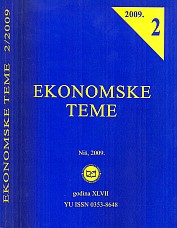Economic Themes (2009) 47 (2) 1, 1-25
Ljubomir Madžar
Abstract: This is a review article dedicated to the newly published book indicated in the subtitle. The importance of the problem area to which the book is dedicated and the elegance and precision of the proper processing are particularly emphasized. The general stance of Professor Pejović in the book strongly supports the institutions as a category of elements that one must pertain to if the determinants and mechanisms of economic development could be explained in a consistent and non-tautological way. Different institutional orders predictably generate visibly differentiated economic performances. Institutional development is a long-term process during which institutions are selected based on their ability to survive in competition with other arrangements. Pejović's insistence on informal institutions was widely accepted. These institutions consist of value orientations, a tradition of conscious ways of behavior, collective memories and other elements of widely understood social consciousness. Informal institutions act as constraints on the development of formal institutions that have acquired their legal articulation through two great traditions in the development of a legal order. They are a continental legal tradition and a common law system. The advantages of this latter system are found in its organic, gradual development and in its greater ability to accumulate and store information and knowledge. This advantage is a matter of its inherently decentralized nature. The final part of the work is dedicated to the limitations imposed by informal institutions in the transition process.
Keywords: Institutions; Constitution; legal system; property rights; contracts and obligations; the rule of law; transition
INSTITUTIONAL ROOTS OF ECONOMIC PERFORMANCE - A Review of the Law, Informal Rules and Economic Performance by Svetozar Pejovich
Ljubomir Madžar
Abstract: This is a review article dedicated to the newly published book indicated in the subtitle. The importance of the problem area to which the book is dedicated and the elegance and precision of the proper processing are particularly emphasized. The general stance of Professor Pejović in the book strongly supports the institutions as a category of elements that one must pertain to if the determinants and mechanisms of economic development could be explained in a consistent and non-tautological way. Different institutional orders predictably generate visibly differentiated economic performances. Institutional development is a long-term process during which institutions are selected based on their ability to survive in competition with other arrangements. Pejović's insistence on informal institutions was widely accepted. These institutions consist of value orientations, a tradition of conscious ways of behavior, collective memories and other elements of widely understood social consciousness. Informal institutions act as constraints on the development of formal institutions that have acquired their legal articulation through two great traditions in the development of a legal order. They are a continental legal tradition and a common law system. The advantages of this latter system are found in its organic, gradual development and in its greater ability to accumulate and store information and knowledge. This advantage is a matter of its inherently decentralized nature. The final part of the work is dedicated to the limitations imposed by informal institutions in the transition process.
Keywords: Institutions; Constitution; legal system; property rights; contracts and obligations; the rule of law; transition

